We can all sense the vibe shift.
Underneath the medical tyranny of COVID, the stolen elections, the Internet censorship, the inflation, the hypermigration, the gender psychosis, the polarized rancor of sexual politics, and all of the rest of the symptoms of our decaying mismanagerial order, a countercurrent has flowed through the deep and hidden places of our collective psyche, hot and slow, like a chthonic river of magma rising implacably to the surface.
It isn’t just frustration with the intolerable imposition of Woke into every aspect of our lives, as though we could reset the clock to 90s liberalism and get fresh again with the Prince of Bel Air. It isn’t just anger at the invasion of our countries by the third world, nor is it limited to impatient disgust with the glossolalic babble of an incompetocracy comprised of credentialed midwits who seem to feel that word-shaped noises confer all the legitimacy they need to misrule our countries into oblivion.
It isn’t purely negative.
There’s a sense, somehow, of hope.
Hope, that after decades in which it seemed that history has stalled, that the culture has been frozen in permafrost, that nothing new could ever really be done again, that Nothing Ever Happens, that the only thing we can look forward to is a long, cold decline into technocratic surveillance, demographic implosion, green energy poverty, and final, irrecoverable collapse ... hope that maybe this insipid fate isn’t so inevitable as we thought. Hope, that the building tectonic pressure of those buried psychological forces might finally break through and crack the shell of a dead future.
The sudden birth of artificial intelligence and the renewed enthusiasm for the conquest of space are two very obvious signs of this abrupt return of novelty. This is not a purely positive thing – AI is regarded with anxiety by almost everyone, but it is the raw fact of its sudden transition from science fiction to mundane tool of everyday life that is significant here.
There are other signs of this sense of renewal. The proliferation of self-improvement culture amongst many of the youth, particularly on the Very Online Right. The rise of the digital nomad, a modern re-enactment of the Romantic wanderjahr. The quiet birth of the network state, for instance in the form of Praxis. The renaissance of thoughtful, long-form essays right here on Substack. Surging interest in the religious traditions of our ancestors, whether in the form of Orthodox Christianity or paganism. The transformation of warfare by drones, promising a revolution in military affairs every bit as epochal as the firearm. The rise of a contradictorily global sense of national particularism. The steady refinement of 3D printing technologies.
Trump’s victory in 2024 seems a sure sign of this vibe shift. In a plot arc that could have been lifted straight from the original Star Wars trilogy, Trump brought A New Hope to America – and the world – in 2016; his forces were shattered and scattered to the winds in 2020 when The Empire Struck Back; only for the rebel forces, tempered by the lessons learned in defeat and strengthened with the assistance of new allies, to Return With the Jedi in 2024 and once again blow up the Death Star. This time around, Trump represents not simply the desperate holding action of an underground resistance to granny state totalitarianism, but the coalescence of a new and vigorous counter-elite, as embodied most of all by the ambitious hectobillionaire space lord who built auctoritatis by buying the digital public square out from under the Empire so he could shitpoast in peace with the chuds.
Each of these has their good and bad aspects – the point, again, is not to dwell on whether any given development will be to our benefit or our detriment. As always, the ramification of second and third-order effects through the social order will result in both advantage and disadvantage. The point is simply that things are changing, that we can all feel it, and that this fuels a sense of nervous excitement that permeates the atmosphere like electrical buzz of a high-tension wire. Perhaps there will be disaster, and we shall drive ourselves to ruin and extinction; perhaps our descendants will walk the stars as near-gods. Either way, we are here, now, at this most interesting of nexus points in the unfolding history of our species. Would you rather be anywhen else?
The pessimism of recent years naturally generated an interest in cyclical theories of history – the empirical Strauss-Howe model of generational turnings, Turchin’s mechanical cliodynamics with its elite overproduction and wealth pumps, Spengler’s mythopoetic conception of cultures as vast organisms whose lifecycles progress through predictable seasons. Hard times make strong men; strong men make good times; good times make weak men; weak men make hard times. Whichever model one favours, the invariable conclusion is that Western civilization is in its terminal winter – fragile, ossified, decadent, corrupt, exhausted, and doomed. Desolation awaits.
Yet a cycle is not defined by its final product, no more than a symphony is defined by its concluding note, a life by its last moment, a wheel by a single turn, or a circle by a single point. Viewed from another angle, the death of Faustian civilization is also the birth of a new civilization ... and even as we are here to live through the death of one, we plant the seeds for the other. With the tempo of history moving faster than ever before due to the global interconnectivity of instantaneous telecommunications and high-speed travel, it may be that our children will live in the savage springtime of that new civilization ... perhaps one animated by the Aenean rather than the Faustian soul, which “will go Mars, not because it is hard, but because it is necessary.” You should read the essay at that last link, by the way. It isn’t long, it’s extremely interesting, and it’s new.
Every civilization must address the human universals, among which are economics, and therefore every civilization needs some kind of money. Following Spengler we should expect that a civilization’s money, like every aspect of a civilization, will be an extension of the central symbol that underlies it. Classical civilization gave us the round coin of precious metal emblazoned with the image of the ruler who stamped it – eternal permanence encased within the geometric embodiment of perfection, as one would expect given Spengler’s identification of the prime symbol of Apollonian civilization as a self-contained geometrical body a la Plato’s Forms. Faustian civilization, with infinite space as its prime symbol, adopted fractional reserve banking – an infinitely extensible and wholly intangible form of wealth.
The symbol of the Aenean soul is the arch – the rise and fall, the gateway, the future grounded on the twin feet of the present and the past. The arch is both an aspiration and a warning; a supporting structure; an opening, and a boundary.
What better form of money than Bitcoin to match the metaphorical properties of the arch? Consider: Bitcoin is bounded, its total supply more strictly limited than any precious metal or rare isotope produced by the cosmic cataclysms of supernovae or neutron-star merger. As the arch, its structure is elegant and mathematically defined. Just as the arch is both rise and fall, Bitcoin is both an opportunity to rise to great wealth, and an unforgiving bitch – if you lose your keys, you lose your Bitcoin forever: the arch is a reminder to responsibility, while Bitcoin forces it. Even its use of ‘keys’ is suggestive of the gateway opened by the arch. The archway’s role as a supporting structure symbolically fits the potential for the cryptographic underpinnings of the Bitcoin blockchain to support an entire financial system, with no need for banks or bankers or kludged-together international payment clearing systems.
It’s at this point in that I must reveal that I have lured you in with a trick. You thought you were reading an essay about the rise and fall of civilizations, but this is actually a promotion.
Almost exactly a year ago, mere days after landing in the cold and gritty streets of Bogota to be greeted by an unexpected total solar eclipse,
approached me to ask if I’d be interested in helping him edit a book he was writing. The title alone caught my interest: The Bushido of Bitcoin. The incorrigible weeb in my xillennial soul was intrigued.「Bittocoin no Bushido desu ka? Hontou ni saibarupanku deshou. Sugoi omorshiroi desu ne, Subetsuki-kun! 」
How hard could it be, I thought, to edit a book? I edit my own writing all the time, obsessively; editing, after all, is a central element in the writing process.
Ha.
It ended up taking an entire year, partly due to my own interfering influence, suggesting this or that revision, wondering if this or that section should be expanded or moved or simply deleted. I’m sure Aleksandar found the entire process deeply annoying.
But now, finally, at long last – it is done.
Here’s the cinematic trailer. Sound on. It’s great.
The Bushido of Bitcoin isn’t really a book about bitcoin. Aleksandar has already written on Bitcoin, extensively; he’s been a bitcoiner for a long time, contributing numerous articles to The Bitcoin Times, going deep into anarchocapitalist theory and such. There’s very little of that in this book.
This is really a book about what comes next.
If – or, as Svetski would insist, when – Bitcoin wins, meaning that it supplants the central bank fiat debt system as our means of settling accounts, what does the world that emerges on the basis of the blockchain look like? That it will be a new world, a new civilization, is hard to doubt. Does it degenerate into a cyberpunk dystopia ruled over by chestless nerds and feckless playboys who got rich by getting lucky by buying early and hodling?
Or is there the potential to build something truly great – something beautiful, something glorious?
Many of you will no doubt be objecting that just rejigging the financial system to pay for things in a different way is not, on its own, going to lead to any sort of glory. You will point out that the basis for such a renaissance cannot be merely technological, that indeed this is precisely the kind of backasswards thinking that brought us to this desultory state of affairs, that what is required above all else is a spiritual renewal, because at the foundation of any society capable of truly great things, there must be great and virtuous men.
Naturally, I would agree. The disappearance over the last century of the very concept of virtu, of manly vigour and courage, from our moral vocabulary, and its near-total replacement by the mercantile concept of ‘values’, this substitution of beliefs that one merely holds like a product, “for you my friend good price!”, as a replacement for a focus on the deep and defining aspects of a man’s essential character, is something I wrote about myself in The Battlefield and the Bazaar.
Virtue is the real subject of The Bushido of Bitcoin – it’s where the bushido part comes in.
Bushido, the way of the warrior, was a codified system of ethics that arose from feudal Japan’s samurai warrior class. Some will wonder why use bushido, a foreign system from an alien people, rather than a homegrown European system such as chivalry; the answer is that it is precisely because bushido was codified in a way that chivalry never was. This provides a convenient framework for a systematic, detailed examination of the warrior virtues - Righteousness, Courage, Compassion, Honour, Honesty, Responsibility, Excellence, Respect, Duty, and Self-Control. Drawing inspiration not only from feudal Japanese society, but also quite extensively upon examples from the Greco-Roman world, European feudalism, and philosophy, the book meditates upon each virtue in depth, considering both their individual natures and implications, and how they form a cohesive whole, each balancing the other so as to prevent any one virtue from becoming a vice in its extremity.
The book is meant to be an instruction manual, introducing an audience accustomed to the austere intellectualizations of libertarian praxeology to the warrior codes of an earlier, more savage, more noble time. It may be inevitable that a new elite sweeps the managerial class aside, but if that new ruling class lacks a sound ethical basis, we will simply leap from the microwave oven to the magnetron. This would be a great tragedy – the Renaissance we yearn for demands something more.
This is not an academic book. So far as I know, Aleksandar does not have a doctoral degree in the subjects he discusses here. Nor, for that matter, do I. In many ways he is taking the reader on a journey – starting from his own initial position as an anarcho-capitalist bitcoiner with an emphasis on libertarian individualism and Rothbardian principles, into a more traditionalist, militant direction rooted in ancient feudal history, Bushido, Spengler, and Nietzsche. As a result he sees all of these subjects with fresh eyes, and carries the reader through with the boundless, excited enthusiasm of a novice discovering this material for the first time.
Svetski’s goal is not only to introduce readers to the virtues but to inspire readers to follow them. He is trying to light a fire ... or, it might be better to say, to squirt a bit of lighter fluid on a fire that is already smouldering. He therefore doesn’t limit himself to a simple catalogue of virtues. The book sets the stage for its examination of the virtues with a stirring overview of the historical context in which warrior cultures developed. It then considers how these virtues can be integrated into society, examining in turn governance (what’s so great about democracy?), culture (can we have a warrior culture in peacetime?), the corrupting influence of wealth (is power such a bad thing?), and the role played by historical cycles (does Bitcoin fix these?). It offers practical advice on the praxis of implementation of the virtues in one’s own ... including, for Bitcoin novices, some helpful pointers on the ‘Bitcoiner’s arsenal’. It then concludes with a short story illustrating Svetski’s vision of a new and vital civilization based on these principles in the process of driving its green shoots through the crumbling bureaucratic concrete of the old order.
Make no mistake ... notwithstanding Trump’s election, Musk’s takeover of Twitter, or any of the other small victories we’ve enjoyed in recent years, our enemies are far from defeated. They remain in control of the institutions – the media conglomerates, the universities, the deep state bureaucracies, the banks, the global megacorporations, and the NGOs and QaNGOs whose influence saturates our political structures from the global level down to the municipal. They retain iron control over the minds, the wallets, the careers, and the lives of many hundreds of millions of people. This is a long war, one that will take us a long time to win. A new civilization is not born overnight, nor does an empire fall in a day.
So far this war has largely been a cold one, waged along cultural and economic lines – a war of information, of ideas, and of production. There is no guarantee that this relatively nonviolent state of affairs will remain; historically, there is every reason to believe that, as times become increasingly tumultuous, it will not. Even if it does, however – even if this long war for the future of humanity retains a primarily spiritual, nonviolent character, it is still a war. The warrior virtues are as important on the psychic battlefronts of the fibre-optic steppe as they are in the trenches.
As the tagline of The Bushido of Bitcoin puts it, “It is better to be a warrior in a garden, than a gardener in a war.” Si vis pacem, para bellum.
You can read an excerpt from the introduction to The Bushido of Bitcoin here:
As of today The Bushido of Bitcoin is available on Kindle and in print. Personally, I recommend the print edition – it is a beautiful 530-page, two-and-a-half bound artifact, lavishly illustrated and lovingly typeset. It will look great on your bookshelf.
As always, I would like to express my gratitude to my supporters, who make it possible for me to do things like editing books about bushido instead of having a real job. If you would like to join the Thark horde that defends Barsoom, it’s as easy as
I’ve been a bit quiet these last couple of weeks, because I allowed myself to get obsessively sucked into a big project whose nature I’m not currently prepared to discuss, save to say that I’ve been having a ridiculous amount of fun with it. No telling when it will be completed, though I hope it won’t take too long. Ha.








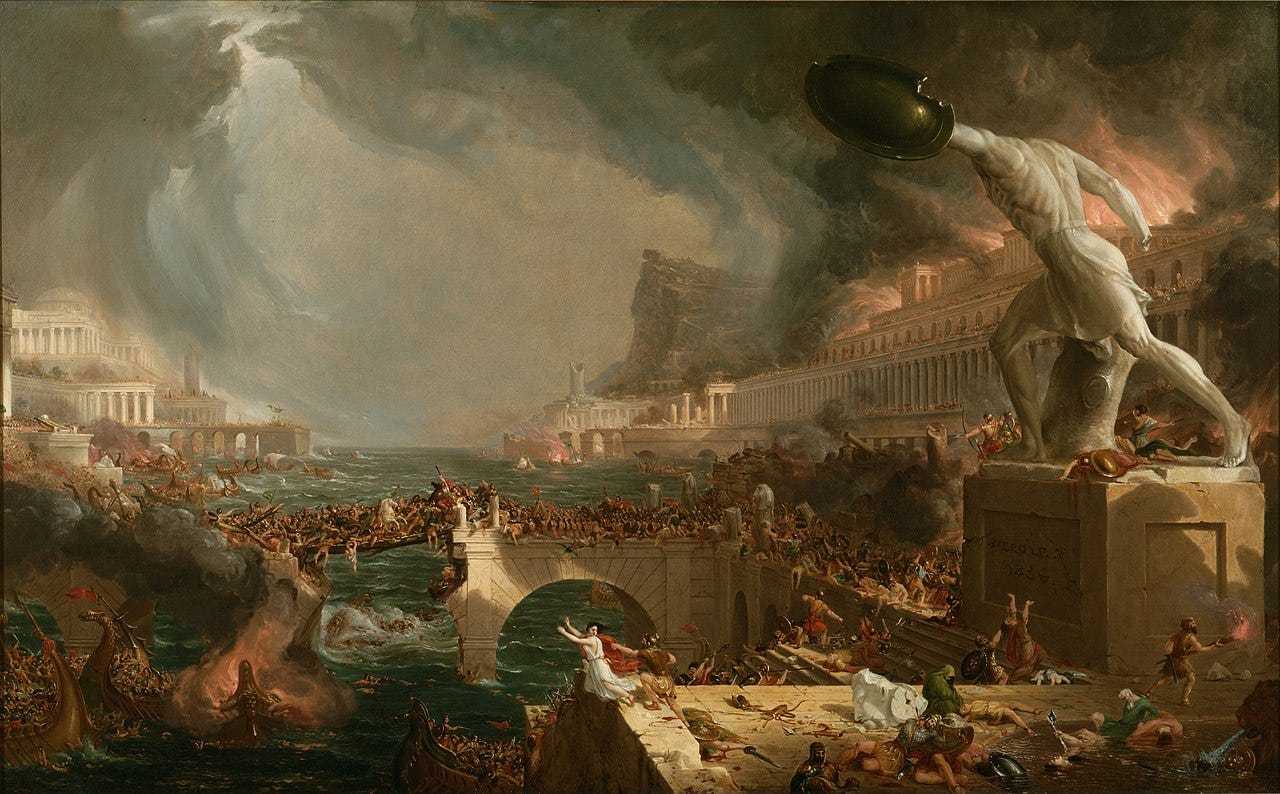

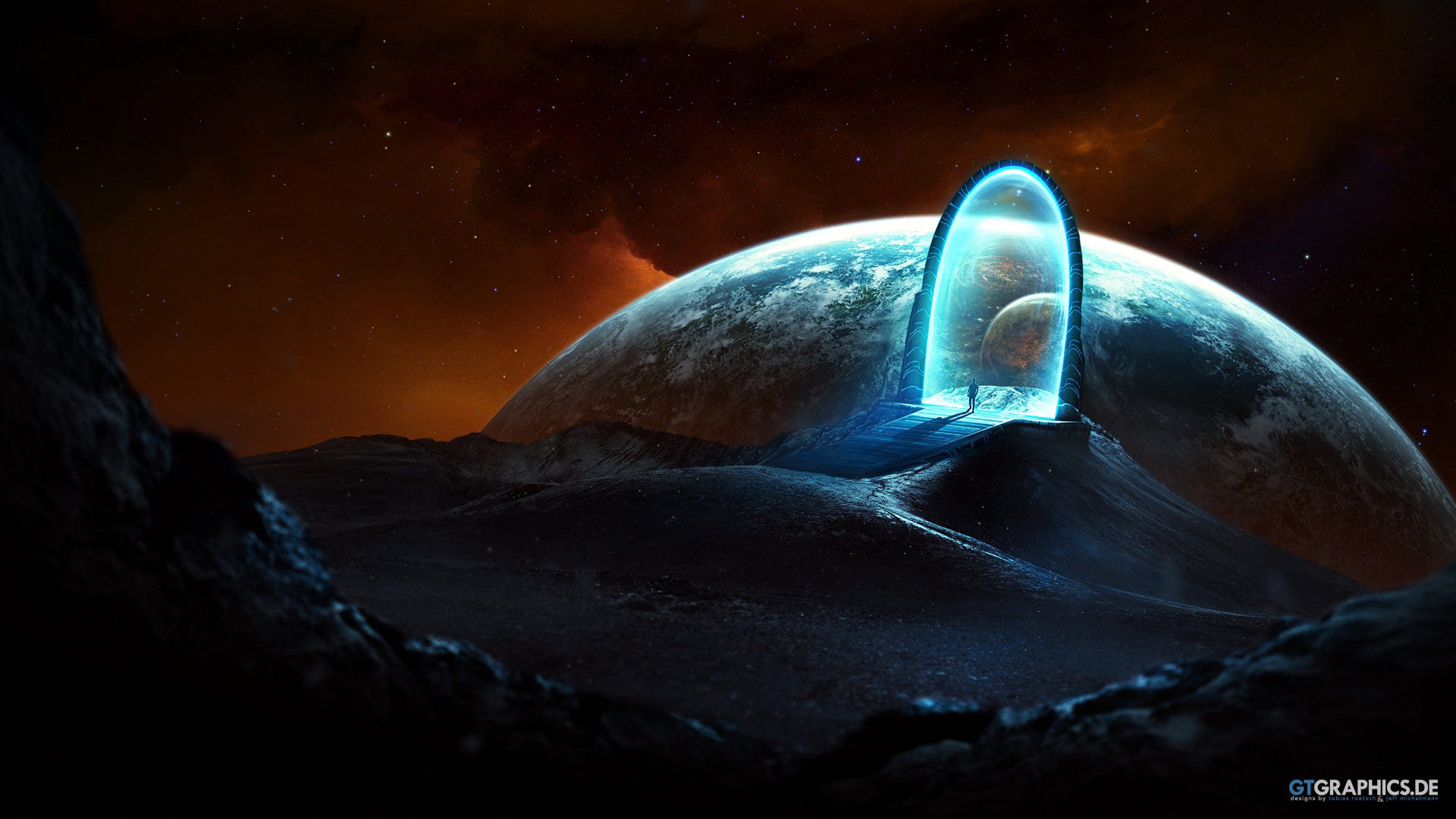
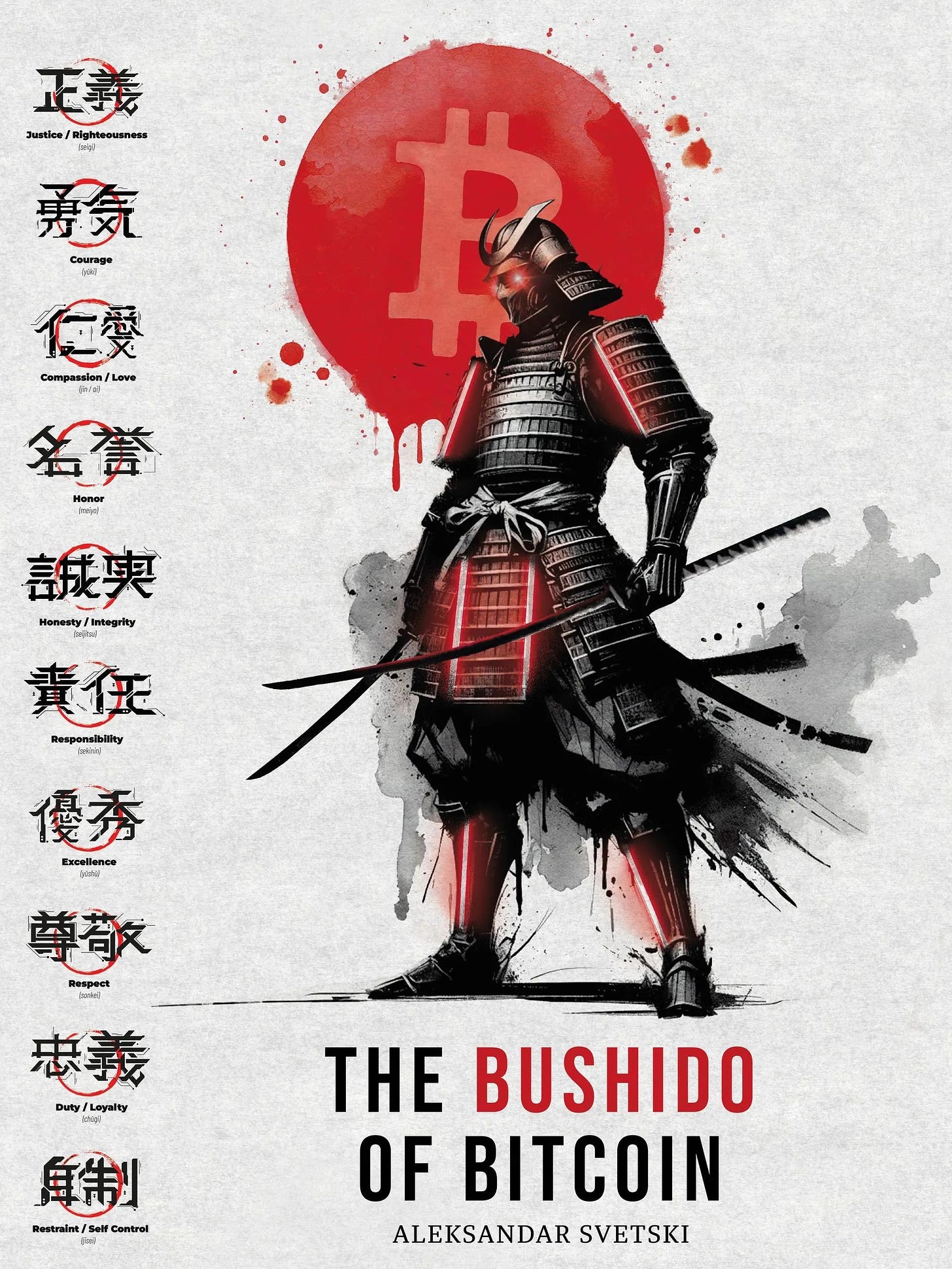
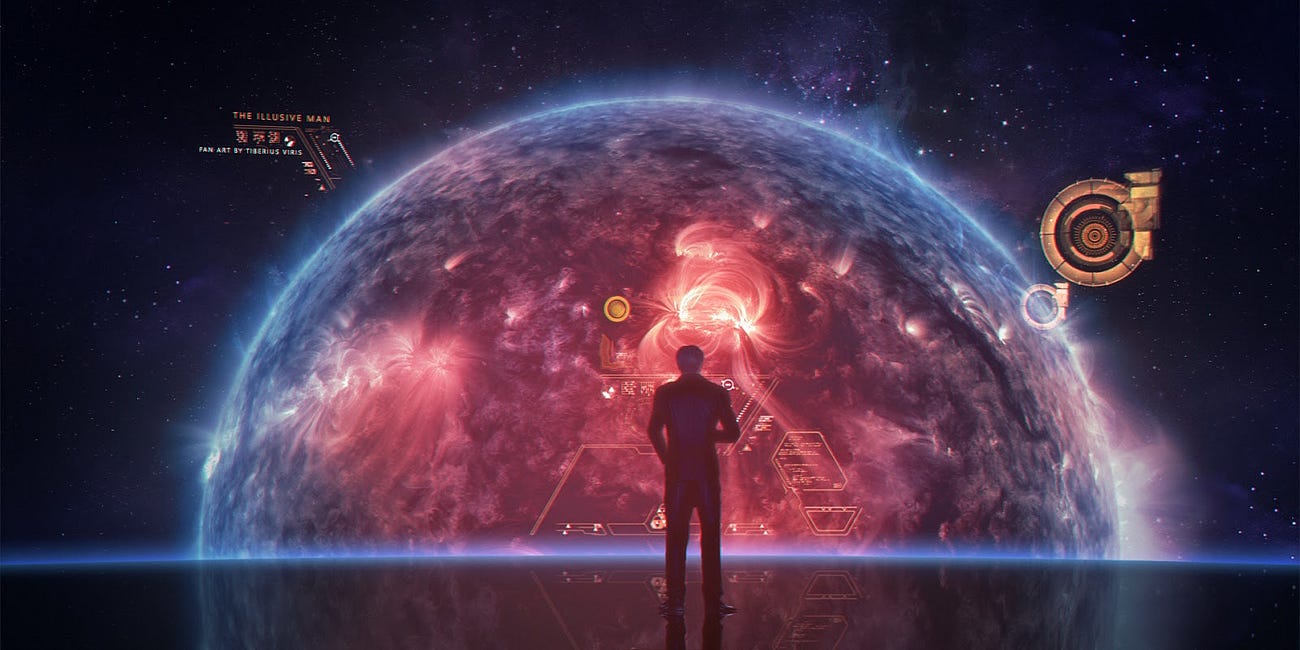
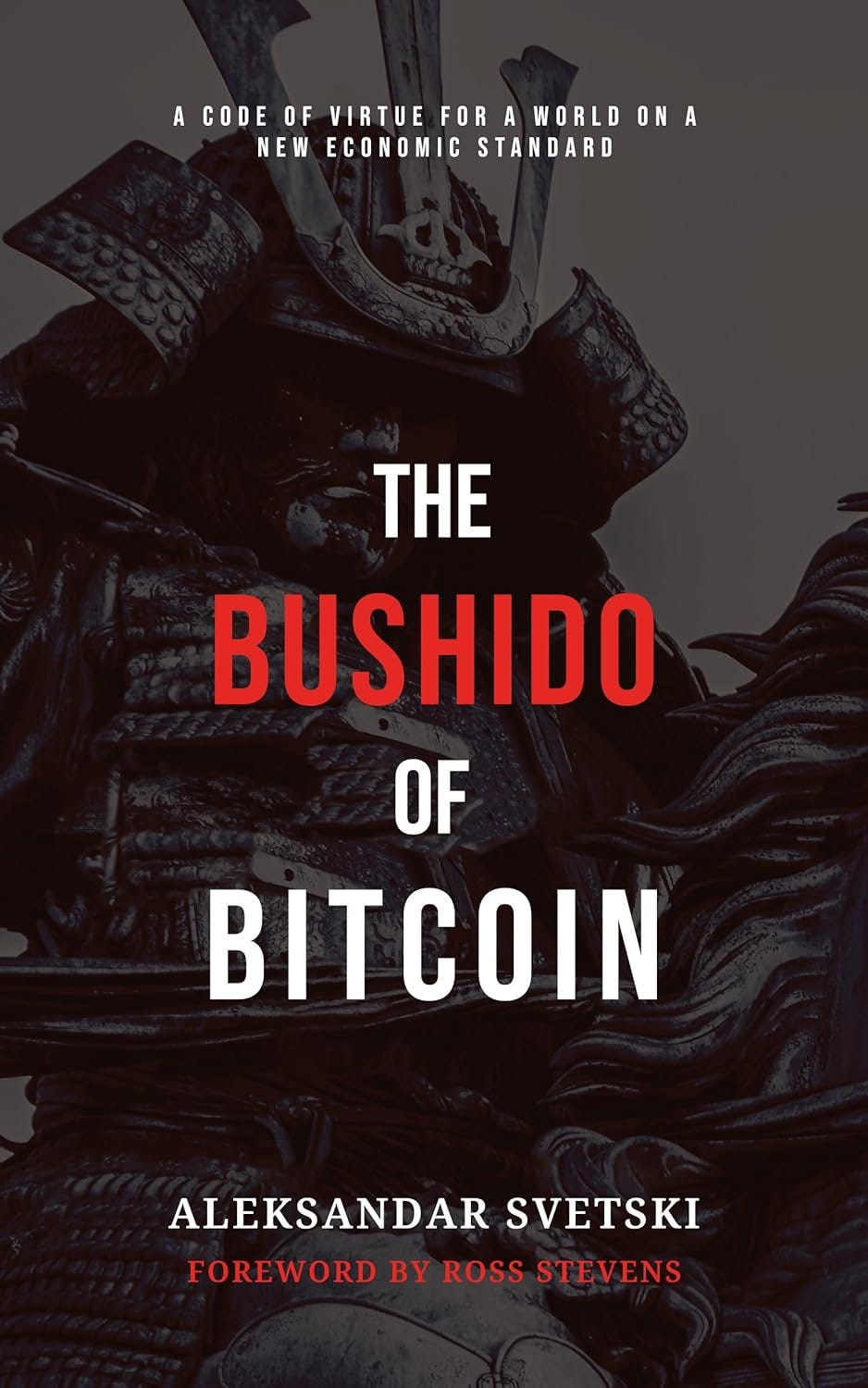
I'm delighted with the election result but you can't kill Wokeness with an election. Woke is the outcome of 50+ years of intelligentsia madness. A Pied Piper Western intelligentsia.....first festering in its humanities and sociological petri dishes in the groves of academe. Then spreading virus-like from there (albeit in varying dilutions) to infect tens of millions of graduate professionals with its groupthink and proscription of 'wrongthink'. So now, to expunge Wokeness, it would be necessary to shut down 70% of academe and then wait at least a generation for the medicine to course through the social fabric. I'm not holding my breath for an end to Wokeness. (And it's also important to not forget that 47% of Americans voted for it on Tuesday.) https://grahamcunningham.substack.com/p/the-madness-of-intelligentsias
I lost some people — friends and relatives — over my Trump votes. But I feel really good and definitely hopeful about the way things are going. Did you see the 2018 Kissinger quote that’s going around on X? Kissinger: “I think Trump may be one of those figures in history who appears from time to time to mark the end of an era and to force it to give up its old pretences. It doesn’t necessarily mean that he knows this, or that he is considering any great alternative. It could just be an accident.” What makes him a great man of history is that he is our sometimes ridiculous, sometimes meandering ship to a more hopeful future. Sometimes I think it’s even possible that someone who seemed more serious to *them* could not have fit through the narrow door to power. They didn’t take him seriously, because I mean he’s a reality TV star, and he’s even more orange than he used to be. And yet it turned out he beat them twice. We don’t have to protect and support and love him because of any specific quality except that for whatever reason he’s the ship we’ve been given to the other side of this ocean of madness. We should not entirely trust anybody, and we have a long road ahead, but I’m hopeful. The vibe shift is palpable.